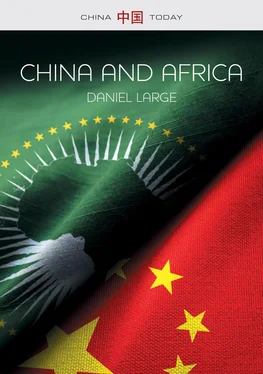During Xi Jinping’s period in office, China’s Africa relations have been ever more defined and shaped by politics, which extends to China’s foreign policy and global politics. The prominence of Beijing’s Africa engagement stands in contrast to the actual economic importance of the continent to China. Africa accounts for around 45% of China’s global development aid but around 4% of China’s total global trade volume in the first half of 2020, and that trade in turn was dominated by a handful of African commodity exporters. 8Similar to trade, China’s investment in Africa is not significant in the context of China’s global investment, accounting for some 3.7% of total outward global investment stock in 2015. Xi Jinping’s Belt and Road Initiative (or BRI) has revised Africa’s former prominence in China’s regional engagements by its global scope. However, for Africa, which accounted for 2.9% of world production, 2.6% of world trade and 16.3% of the world’s population in 2019, China’s investment and engagement means much more. 9
The centrality of politics flows from Xi Jinping’s leadership of China and the more established, far-reaching nature of Chinese engagement in Africa. Before Xi, from 1978 China’s leaders after Mao prioritized economic development as the way to maintain power. By prioritizing politics, Xi Jinping has done the opposite, starting with attempting to renew the CCP’s legitimacy, and reasserting its dominance over all walks of life. It was also inseparable from Xi’s more ambitious foreign policy. Xi Jinping has sought to redefine China’s Africa relations in his terms, including incorporating Africa more overtly into the CCP’s vision for China’s future centrality in world affairs. China’s 53 African state allies are important in China’s foreign policy and global multilateral role in this context. Since African state votes helped the People’s Republic of China (PRC) enter the UN in 1971, the continent has been a significant part of China’s multilateral engagement but the stakes have become higher in the New Era, which has seen more explicit promotion of the CCP’s China model. In turn, China is more important in the foreign relations and global politics of many African states. Economic relations have been evolving from years of high growth rates until 2014, when global commodity prices fell. The idea that Chinese investment could propel Africa to become ‘the next factory of the world’ became popular. 10Since around 2015, trade and investment have declined, debt mounted for some African states and, in 2020, the first recession in 25 years hit many African countries. China now has a more established, multidimensional and consequential presence across the continent: it is an emerged power. The importance of China within African politics on the back of its evolved economic and global role represents a major, historically unprecedented change.
In 2020, when there were celebrations to mark the 20th anniversary of FOCAC, the 2006 summit had faded into history, and China’s domestic and global politics looked very different. Xi’s leadership saw China become a self-declared major power with a clear sense of long-term global strategic purpose. China’s relations with Africa have seen a transformation, having widened, deepened and diversified, and becoming dominated by issues like industrialization or security, which were absent in 2006. Africa is part of China’s global rise, now proceeding in the context of open strategic competition with the United States of America (US). Overall, politics has become far more important, in the context of economic challenges, changing global politics and higher stakes.
Interest in China–Africa relations has grown exponentially. 11It is expressed in ever more diverse ways, including in literature, art and film. China–Africa is an intensely mediated subject and reflects changes in the global media landscape under the impact of digital technologies and social media, which has recently become more prominent in African countries (some more than others) and in global conversations about China and Africa. 12Chinese diplomats in Africa now use social media like Twitter to promote official views, for example, but in China, the tightly controlled media must, as Xi Jinping has said, ‘love’, ‘protect’ and serve the interest of the CCP, or be ‘surnamed Party’. Like domestic issues, media coverage of Africa relations in China has to follow the official line.
China–Africa relations are often described in simplistic and sensational ways, not just by commentators but also by politicians in and outside African countries. Binary terms are commonly used, such as ‘win–win development’ or ‘new imperialism/colonialism’; ‘partner or predator’; ‘saviour or monster’; ‘parasitism or mutualism’ etc. In addition, simple, monocausal metanarratives officially explain China’s engagement as win–win development or reduce this to imperialism, dependency, or exploitation. It follows that grand causal claims frequently attend the subject; such as that China has undermined democracy or human rights, or has engaged in a deliberate strategy of entrapping African governments in debt. Such claims can place unwarranted agency in China and neglect actual African politics, multistranded external relations and forms of agency. While it is all too easy to blame the media, this influences opinion, can shape worldviews and impact policy engagements. In short, images and language matter, especially when added to personal experience in African countries. The topic of China’s relations with Africa has become an information minefield. Rumours, misunderstandings, or those looking for profitable attention can manufacture myths that can take on a life of their own and fuel politics in an age where social media matters. 13Emotive online news stories about Chinese exports of human flesh or plastic rice to Zambia, Kenya, Nigeria, Ivory Coast and Senegal, for example, have been proved false but have nonetheless continued to appear, spread disinformation and influence popular perceptions about China.
The subject of China and Africa relations has grown as an area of academic research, moving from a previously peripheral small field mainly concerned with international relations towards much more multi-disciplinary approaches. 14African studies have grown within China. Efforts have been made to promote China-related research and education about China in an increasing number of African countries. As well as being relevant to business, this is also a very policy-oriented subject. One obvious problem with the meta-organizing tag ‘China–Africa’ is that this is shorthand for an increasingly diverse range of studies, conversations, media coverage, human encounters, and forms of political contestation. More than a conversation or subject of debate by spectators, this is also a meaningful, lived reality for many. China–Africa is not a subject that follows any neat, coherent narrative but has become a topic about which opinion is required and, increasingly, judgement.
Much China–Africa analysis takes development and economics as its starting point or primary interest. 15This is essential; however, any focus on economics is insufficient when it comes to approaching China–Africa relations. This has become more readily apparent in recent years with the evolution of more complex relations that, at a minimum, combine history, economics, politics and international relations. In this way, political economy approaches seek to better locate and explore China’s role beyond forms of methodological statism that ignore wider structural forces. 16The tendency to isolate and magnify China’s role has been criticized; some have argued that studies of China–Africa engagements throw broader processes like neoliberalism in Africa into starker relief. Studies utilizing a global political economy framework have thus offered reflections on the extent to which economic investment in Zambia, for example, is or can be considered ‘Chinese’, or reflects qualities, political relations and patterns of exploitation familiar in the global behaviour of capital. 17This perspective recasts the Chinese role as a new chapter in global capitalist relations. 18Such an approach, while important, risks downplaying CCP New Era Chinese characteristics and connections. In the attempt to demonstrate conformity to historical extraversion or the logic of capital, the Chinese qualities of these dynamics, even when mediated by hybrid global dynamics, can be stripped away and questions about forms of CCP-governed Chinese power avoided.
Читать дальше












